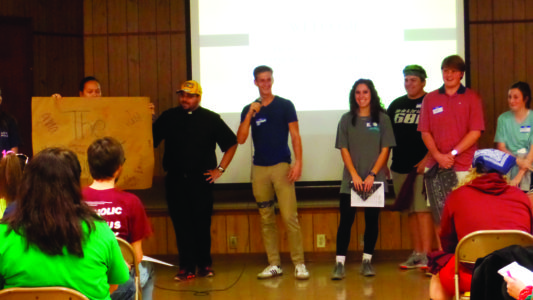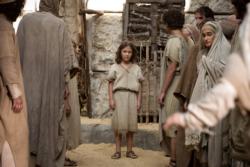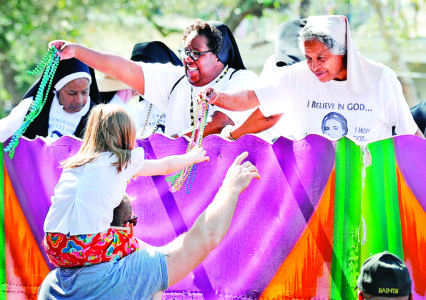By Carol Zimmermann
WASHINGTON (CNS) – When St. Patrick’s Day falls on a Friday, as it does about every seven years, the Lenten rule requiring Catholics to abstain from meat on Fridays collides with the long-held tradition of eating corned beef and cabbage.
The two occasions meet this year. March 17 marks the celebration of St. Patrick – known as the Apostle of Ireland for his years of missionary work there – and it also is a celebration of all things Irish and even green. This March 17, since it falls on a Friday in Lenten, also is a time of penitence.
The timing has not gone unnoticed by some U.S. bishops. Before Lent even started, many of them – including Bishop Joseph Kopacz of the Diocese of Jackson – issued dispensations for Catholics in their dioceses allowing them to eat meat on St. Patrick’s Day.
The dispensation does not take Catholics totally off the hook. Many bishops advised Catholics older than age 14, who are required to abstain from meat on Friday, to do an extra act of charity or penance in exchange for eating meat.
Bishop Robert C. Morlino of Madison, Wisconsin, took it a step further. In a statement, he said Catholics should also “exercise due moderation and temperance in festivities and celebrations of the memorial of St. Patrick, in keeping with the solemnity and honor that is due to so great a saint and his tireless efforts to inspire holiness in the Christian faithful.”
He tempered that by also saying the day should “foster a joyful and reverent devotion to that great saint” and should also “honor the patrimony of the Irish people to whom he first preached the good news of salvation.”
As of Feb. 27, the following dioceses or archdioceses had announced giving the clear for Catholics to eat meat March 17: Jackson, Miss., Baltimore; New York; Milwaukee; St. Paul and Minneapolis; Atlanta and Savannah, Georgia; Omaha, Nebraska; and Jefferson City, Missouri.
The bishops primarily announced the one-day lifting of the church rule in statements posted on their diocesan websites.
Omaha Archbishop George J. Lucas granted a dispensation from the meat observance but those who eat meat on St. Patrick’s Day must abstain the next day, March 18.
New York Cardinal Timothy M. Dolan sent archdiocesan pastors a letter in late January notifying them of the dispensation and asking them to let their parishioners know about it.
Milwaukee Archbishop Jerome E. Listecki noted that abstaining from meat on Fridays in Lent is an “important dimension of the penitential nature of the season,” but he said Catholics in the archdiocese that day would not be required to give up meat “given the many celebrations that occur on this day,” which in the archdiocese also includes the ordination of two auxiliary bishops that afternoon.
Catholics in the Archdiocese of St. Paul and Minneapolis received a letter in late February from Susan Mulheron, chancellor of canonical affairs, saying the dispensation for St. Patrick’s Day had been issued by Archbishop Bernard A. Hebda after consulting archdiocesan leaders.
She said the archbishop considered past practice and present circumstances and decided the dispensation “would serve the common spiritual good.”
“As a general rule, a request for a dispensation from the obligation of abstinence on Fridays of Lent will not be considered unless some serious reason is present,” she wrote, adding that St. Patrick’s Day has “traditionally been an occasion for joy-filled celebrations in this archdiocese.”
Archbishop Hebda hinted he might grant the dispensation when he spoke at a Theology on Tap gathering Feb. 8 in St. Paul. When someone in the crowd asked him about the possibility of eating meat on St. Patrick’s Day, the archbishop asked for a show of hands of those who wanted to eat corned beef to honor St. Patrick.
“When you get a dispensation – and I think it’s coming – you should do penance on another occasion,” he told the crowd. “So, it’s like a get-out-of-jail-free card, but you have to pay sometime.”
Author Archives: Melisa Munoz
Bishop Kopacz: end death penalty instead of expanding
Bishop Joseph Kopacz released the following statement on Monday, March 6, opposing the death penalty. The statement is in reaction to House Bill 638, which calls for additional forms of execution in the state of Mississippi if the current method, lethal injection, is declared unconstitutional.
Lethal injection has come under fire in recent years as some inmates have seemed to suffer as they were executed. The drugs used have also become more difficult to obtain because of the controversy. Mississippi has not been able to execute anyone since 2012 because of pending court cases. This bill would allow a gas chamber or electrocution as alternate methods.
As the State of Mississippi’s Legislature debates the expansion of methods in support of the resumption of capital punishment, (H.B. 638) we respectfully submit the perspective and teachings from our Catholic faith that promote the abolition of the death penalty. We encourage and pray for a more comprehensive debate that calls into question our assumptions the moral legitimacy of the death penalty in the state and in our nation.
If, however non-lethal means are sufficient to defend and protect people’s safety from the aggressor, authority ought to limit itself to such means as these are more in keeping with the concrete conditions of the common good and more in conformity with dignity of the human person. Today the state, by rendering one who has committed the offense incapable of doing harm, without definitively taking away from him or her the possibility of redemption, the cases in which the execution of the offender is an absolute necessity, are very rare, if not practically non-existent. (Catechism of the Catholic Church 2267)
When dwelling on legal and moral arguments concerning the death penalty, we should do so not with vengeance and anger in our hearts, but with the compassion and mercy of the Lord in mind. It is also important to remember that penalties imposed on criminals always need to allow for the possibility of the criminal to show regret for the evil committed and to change his or her life for the better. We do not teach that killing is wrong by killing those who kill others. Saint Pope John Paul II has said the penalty of death is both cruel and unnecessary. Likewise, the antidote to violence is not more violence.
It has been nearly a year since our Catholic community suffered the tragic murders of Sister Paula Merrill, SCN, and Sister Margaret Held, SSSF, who served at a medical clinic in Holmes County. Immediately, in the midst of their profound loss, both the religious communities to which they belonged and their families stated time and again that they are opposed to the death penalty as a further assault against human dignity. We wholeheartedly agree.
Bishop Joseph R. Kopacz
Ash Wednesday: Ancient tradition still thrives in modern times
By Carol Zimmermann
WASHINGTON (CNS) – In more ways than one, Ash Wednesday — celebrated March 1 this year – leaves a mark.
That’s because not only are Catholics marked with a sign of penitence with ashes on their foreheads, but the rich symbolism of the rite itself draws Catholics to churches in droves even though it is not a holy day of obligation and ashes do not have to be distributed during a Mass.
Almost half of adult Catholics, 45 percent, typically receive ashes – made from the burned and blessed palms of the previous year’s Palm Sunday – at Ash Wednesday services, according to the Center for Applied Research in the Apostolate at Georgetown University.
Parish priests say they get more people at church that day than almost any other – excluding Christmas and Easter – and the congregations are usually much bigger than for Holy Thursday or Good Friday services.
“Virtually every parish that I’ve worked with will have more people come to Ash Wednesday than almost any other celebration,” said Thomas Humphries, assistant professor of philosophy, theology and religion at St. Leo University in St. Leo, Florida.
“We talk about Christmas and Easter as certainly being the most sacred and most attended events during the year, but Ash Wednesday is not even a day of obligation. In terms of liturgical significance, it’s very minor, but people observe it as overwhelmingly important,” he said in a Feb. 17 email to Catholic News Service.
Humphries said part of the Ash Wednesday draw is the “genuine human recognition of the need to repent and the need to be reminded of our own mortality. Having someone put ashes on your head and remind you ‘we are dust and to dust we shall return’ is an act of humility.”
He also said the day — which is the start of Lent in the Latin Church — reminds people that they are not always who they should be and it is a chance to “stand together with people and be reminded of our frailty and brokenness and of our longing to do better.”
“This practice is particularly attractive to us today because it is an embodied way to live out faith, to witness to Christian identity in the world, ” said Timothy O’Malley, director of the Notre Dame Center for Liturgy at the University of Notre Dame, where he also is a professor of New Testament and early Christianity.
He said that’s the only way to explain why millions of people identify themselves “as mortal sinners for an entire day.”
Jesuit Father Bruce Morrill, the Edward A. Malloy professor of Catholic studies at Vanderbilt University Divinity School in Nashville, Tennessee, thinks the appeal of Ash Wednesday is partly because participants receive a “marker of identity” as Catholics.
The day also has rich symbolism, he said, of both flawed humanity and mortality. He pointed out that even though a large percentage of Catholics do not go to confession they will attend this very penitential service because they “get a sense of repentance and a kind of solidarity in it.”
“Clearly it touches on a deep sense of Catholic tradition in a way few other symbols do,” he told CNS Feb. 17.
For many, it also links them to childhood tradition of getting ashes. It also links them, even if they are unaware of its origins, to an ancient church tradition.
The priest said the use of ashes goes back to Old Testament times when sackcloth and ashes were worn as signs of penance. The church incorporated this practice in the eighth century when those who committed grave sins known to the public had to do public penitence, sprinkled with ashes. But by the Middle Ages, the practice of penance and marking of ashes became something for the whole church.
Ash Wednesday also is one of two days, along with Good Friday, that are obligatory days of fasting and abstinence for Catholic adults – meaning no eating meat and eating only one full meal and two smaller meals.
The other key aspect of the day is that it is the start of the 40 days of prayer, fasting and almsgiving of Lent.
“Ash Wednesday can be a little bit like New Year’s Day,” Father Mike Schmitz, chaplain for Newman Catholic Campus Ministries at the University of Minnesota Duluth, told CNS in an email. He said the day gives Catholics “a place to clearly begin something new that we know we need to do.”
Bishop, advocates oppose sanctuary cities bill
By Maureen Smith
JACKSON – A bill that would keep agencies, cities and college campuses in Mississippi from offering sanctuary to unauthorized immigrants would not keep communities safe and goes against the Christian tenet of caring for those in need, said Bishop Joseph Kopacz of Jackson.
He issued a statement Feb. 15 opposing S.B. 2710, also known as the “sanctuary cities” bill, which passed the state Senate in a 32-16 vote Feb. 9. The bill goes to the state House for consideration.
The measure would prohibit cities and institutions of higher learning from declaring themselves sanctuary cities. There are currently no sanctuary cities in the state, although the city of Jackson proposed such a declaration last year.
“As Christians we are called to welcome the stranger and care for those in need. As citizens, we are called to keep our communities strong and safe. We feel that the so-called ‘sanctuary cities’ bill being debated right now in the Mississippi Legislature damages both of those efforts,” wrote Bishop Kopacz.
In a sanctuary city, local law enforcement would not be forced to act as federal immigration agents, like the officers of U.S. Immigration and Customs Enforcement (ICE). In fact, they would be prohibited from asking a person they detained about his or her immigration status. S.B. 2710 would prohibit cities from enacting sanctuary policies.
The bill’s opening statement says it would apply to entities such as “a state agency, department, political subdivision of this state, county, municipality, university, college, community college or junior college, or any agent, employee or officer thereof.”
Immigrant advocates said the bill raises several concerns.
Amelia McGowan, an immigration attorney for the Catholic Charities Migrant Resource Center based in Jackson, said the vague language, especially in relation to schools, opens up a number of potential problems.
“The first provision is potentially extremely dangerous. It could allow any state official, or anyone working for the state government to report any individual to federal immigration authorities. In other words, it prevents the state and local agencies from prohibiting its employees from reporting an individual to ICE,” said McGowan in an email to the Mississippi Catholic, newspaper of the Jackson Diocese.
“That means, undocumented – or suspected undocumented – individuals seeking services in any state or local agency – courts, police protection, K-12 education, higher education, state hospital, state health and mental health agencies – could be reported to ICE by a disgruntled employee,” McGowan explained.
It also means an agency “could not prohibit its employees from doing so,” she continued. “Now, presumably that person may be protected in some cases by privacy laws, but I am afraid that this provision would prevent individuals from seeking state services, which include reporting violent crimes to the police.”
According to Christy Williams, an attorney at the headquarters of the Catholic Legal Immigration Network, known as CLINIC, in Silver Spring, Maryland, the provision also opens up municipalities to potential liability. A school employee who discloses a student’s immigration information could be violating federal privacy laws and the school could be held liable.
If any officer reports a person they suspect is in the country without legal permission but that person turns out to have a valid legal status, the local agency can be sued. CLINIC highlighted one example from Allentown, Pennsylvania, when officers arrested a U.S. citizen for alleged drug crimes.
“He had both his driver’s license and Social Security card with him at the time of the arrest and was eventually found innocent,” according to a CLINIC document about sanctuary cities. “During his time in custody, the police called ICE based on the presumption that, because of his race, he was undocumented.
“Despite being documented, the citizen was held for three days after posting bail based on an ICE detainer. He was released only after an ICE agent interrogated him and confirmed his citizenship. The U.S. citizen sued local and county officials in 3rd District Federal Court, leading to verdicts in his favor and settlement costs totaling nearly $150,000,” the document said.
When a local agency reports someone to ICE, the federal agents may ask the local agency to detain the suspect. The local agency has to absorb the cost of housing, feeding and caring for the person until ICE can process the case. That money is rarely reimbursed to state and local agencies.
Critics of the Mississippi bill say that because it is vague, it also could erode the relationship first responders have with their communities. If immigrants, even those in the country legally, believe police officers, medical personnel or firefighters are going to report them to immigration officials, they may hesitate to call for much-needed help.
McGowan said she thinks if the bill becomes law, it “would have a chilling effect on individuals seeking state services” such as medical care, mental health care and police protection,” and would negatively affect immigrants’ educational opportunities. She also thinks it would subject victims of violent crimes and/or abuse “to greater danger.”
President Donald Trump has pledged to strip federal funds from jurisdictions that declare themselves “sanctuary cities.”
“We urge lawmakers and advocates to oppose S.B. 2710,” Bishop Kopacz said in his statement. “We will, as a Catholic community, continue to work with immigrants and refugees – welcoming their contributions to our community and culture – even as we pray for a just solution to the challenges of immigration and security.”
(Editor’s note: the full text of the statement is available here.)
Diocesan Confirmation retreat builds community

Teens play an icebreaker called ‘people bingo.’

CLINTON — More than 160 young people from across the diocese gathered at Camp Garaway for the diocesan Confirmation Retreat Feb 6-7. In small inset, a poster identifies the ‘pink doves’ group. The small groups gave themselves names based on a color assigned to (Photos by Melissa Smalley)
By Fran Lavelle
CLINTON – What do you get when you mix the Holy Spirit, enthusiastic high school students, dedicated catechists, faith filled college students, an engaging speaker and a beautiful weekend at Camp Garaywa in Clinton? An awesome diocesan high school Confirmation Retreat! The retreat focused on how we are called to service in our families, our community and the world. The Confirmation students were challenged to look for opportunities for service from the smallest acts of kindness.
The retreatants came from parishes of all sizes and demographics from around the diocese Feb. 6-7. Gathered tog
ether, the youth beautifully represented the reality of our Catholic faith in the Diocese of Jackson. All together more than 160 youth and adults came together in to pray, reflect, listen and prepare for the Sacrament of Confirmation.
Our speaker was Cari Williams, a youth minister and retreat leader from the Diocese of Alexandria, La. Father Rusty Vincent served as the spiritual director for the weekend. We were blessed to have Catholic students from Mississippi State serve as small group leaders.

Father Rusty Vincent, spiritual director for the retreat, in the LSU hat, helps with an activity.
On Saturday evening, retreatants had an opportunity to go to Reconciliation and Sunday morning Bishop Joseph Kopacz celebrated Mass. Recognizing the importance of the sacramental life of the Church helped them better understand the value of completing the sacraments of Initiation through Confirmation. The youth appreciated the opportunity to spend time with Bishop Kopacz. The six priests who came out to hear confessions include Msgr. Elvin Sunds, Fathers Jeffrey Waldrep, Jose Sanchez, Joseph Le, Jason Johnston and Vincent. It was an awesome sight to see nearly every student and adult present to take advantage of the Sacrament of Reconciliation.
Asked what they would take away from the retreat many of the young people commented that they recognized a need to spend more time with God. They also saw what the
larger Catholic Church in our diocese looks like, especially for smaller parishes with 2-3 students in the Confirmation program.
Making new friends was a natural by-product of the weekend. I hope they continue to pray for one another and reflect on the message of service. I invite you to pray for all the young people in our diocese who are being prepared for the Sacrament of Confirmation. They need our prayers as much as we need their full and active participation in the Church. Confirmation is not Catholic graduation. It is only the beginning of a wonderful life of faith, service and friendship.
(Fran Lavelle is the Director of Faith Formation for the Diocese of Jackson.)
Youth News
HERNANDO Holy Spirit, Labor of Love, Saturday, March 11. All 7-12 graders are invited to join us as we help a SHSM client who needs assistance with home repair. Adult helpers are needed as well. Deadline for registering is Sunday, March 5. Details: contact Amanda at (662) 429-3467or holyspiritchurch@shsm.org.
MEMPHIS, Tenn., St. Francis Hospital, mother/daughter program to learn about God’s plan for growing up, becoming a woman and His gifts of sexuality, fertility and chastity, Sunday, March 19, for 10 – 12-year-old girls and Sunday, March 26 for 13 – 16-year-old girls and their mothers. All programs begin at 2:00 p.m. at Saint Francis Hospital, 5959 Park Avenue in Memphis. $25.00 per family. Pre-registration is required. Register online at www.cdom.org. Go to bottom of page and click “2017 Mother/Daughter Programs”. Details: Mary Pat Van Epps at Diocese of Memphis NFP Center (901) 373-1285.

MERIDIAN – St. Patrick School students Elizabeth Rush and Amelia Jones carry the first grade banner during the March to City Hall on the Monday of Catholic Schools week.

JACKSON – Knights of Columbus Council 15131 hosted its annual Free Throw Competition Saturday, January 28, in the St. Richard Gym. Eleven of the 32 contestants qualified for the regional/state competition set for February 18. The winners included overall winner Alan Garrison. Lilly Luckett and Cy Stephens, both age 10, Sabine Cook and Charlie Zhang, both 11, Cooper Chaplain, age 12, Robert Archer, age 13, Farrell Moorehead and Nicholas Brilley, both 14), Michael Doherty, 15, and Cullen Moorehead, 16. (Photo courtesy of Rusty Haydel)

NATCHEZ – Stephanie Daly, Science Lab Facilitator, assists fourth grade students Autumn Ferguson, Landon French, Troy Dillon and Kolemyn Fisher in an experiment to see which type of citrus fruit produces the biggest reaction with baking soda. They were testing oranges, lemons, limes and grapefruit. (Photo courtesy of Cara Serio)

Culumbus – Eighth-grade student, Matthew Swiderski gets dusted at the CSW color run. (PHoto by Katie Fenstermacher)
The 10 best movies and family films of 2016
By John Mulderig
NEW YORK (CNS) –The quality of the best Hollywood films was higher in 2016 than in some recent years. But the outstanding movies of the 12 months just past tended to deal with challenging subject matter. Assassination, the exactions of combat, even religious repression enforced through torture were all dealt with in a skillful way – but also in a manner not likely to appeal to the casual moviegoer.
Following are the Media Review Office of Catholic News Service’s top 10 movies overall and top 10 family films of 2016. The selections in each category are listed in alphabetical order.
Unless otherwise noted, the Catholic News Service classification for films on the first list is A-III – adults, and the Motion Picture Association of America rating is PG-13 – parents strongly cautioned. Some material may be inappropriate for children under 13. For movies on the family list, except as indicated, the CNS classification is A-II – adults and adolescents, and the MPAA rating is PG – parental guidance suggested. Some material may not be suitable for children.
The top 10 overall:
– Amy Adams delivers an excellent performance as an American linguist trying to communicate with aliens in the gripping and unusually intimate science-fiction drama “Arrival.” Director Denis Villeneuve’s adaptation of a short story by Ted Chiang finds profundity on a human scale as well as in the cosmos.
– Suffering mingles with brutal honesty and joy in unexpected moments in the first screen version of August Wilson’s Pulitzer Prize-winning 1983 play “Fences.” Director Denzel Washington stars as an embittered Pittsburgh garbage collector while Viola Davis plays his compassionate and understanding wife, the moral center of this family drama.
– The extraordinary heroism of World War II Army medic Desmond T. Doss (Andrew Garfield), a committed Christian and conscientious objector who refused to bear arms but was nonetheless eager to serve his country, is vividly realized in the inspiring, though bloody, fact-based drama “Hacksaw Ridge,” directed by Mel Gibson (L – limited adult audience, films whose problematic content many adults would find troubling; R – restricted. Under 17 requires accompanying parent or adult guardian).
– “Hell or High Water” is the morally intricate tale of two brothers (Ben Foster and Chris Pine) who go on a bank-robbing spree to save their family farm. Their cat-and-mouse game with a duo of Texas Rangers (Jeff Bridges and Gil Birmingham) has tragic consequences in director David Mackenzie’s hardscrabble story of exploitation and desperation (L; R).
– Director Theodore Melfi successfully re-creates the tension of the Cold War space race and the struggles of the civil rights era in the appealing fact-based drama “Hidden Figures.” Taraji P. Henson, Octavia Spencer and Janelle Monae star as extraordinarily gifted mathematicians working for NASA, while Kevin Costner plays Henson’s hard-driving boss (PG – parental guidance suggested. Some material may not be suitable for children).
– Luminescent and respectful of religion, director Anne Fontaine’s drama “The Innocents,” about a fictional Benedictine convent in post-World War II Poland, gently explores the conflicts between duty to the living and the shattered faith that can result from acts of depravity. Lou de Laage stars as a French Red Cross doctor.
– Director Pablo Larrain’s fact-based historical drama “Jackie” features a mesmerizing performance by Natalie Portman as Jacqueline Kennedy, reflecting on loss while building the Camelot myth in the weeks following her husband’s (Caspar Phillipson) 1963 assassination. Catholic viewers will find her conversations with a priest (John Hurt) of particular interest (R).
– The incredible true story of Saroo Brierley (Dev Patel) and his 20-year odyssey to locate his birth mother (Priyanka Bose), is retold in the uplifting and emotional drama “Lion,” directed by Garth Davis. A celebration of family, the movie also sends a strong pro-life message by underscoring the joys and merits of adoption.
– “Silence” is director and co-writer Martin Scorsese’s dramatically powerful but theologically complex adaptation of Catholic author Shusaku Endo’s 1966 fact-based historical novel about two 17th-century Jesuit missionaries (Andrew Garfield and Adam Driver) facing persecution in Japan. Often visually striking, the film is also deeply thought provoking (L; R).
-– In “Sully,” director Clint Eastwood crafts a satisfying profile of US Airways pilot Capt. Chesley Sullenberger (Tom Hanks), whose 2009 feat in landing his crippled plane on the Hudson

Arron Eckhart and Tom Hanks star in a scene from the movie “Sully.” The Catholic News Service classification is A-III — adults. The Motion Picture Association of America rating is PG-13 — parents strongly cautioned. Some material may be inappropriate for children under 13. (CNS photo/Warner Bros.) See MOVIE-REVIEW-SULLY (EMBARGOED) Sept. 8, 2016.
River gained him instant fame. What emerges is the portrait of a morally deep-rooted and honorable man with a heartfelt concern for those in his charge.
The top 10 family films:
– “Finding Dory,” writer-director Andrew Stanton’s dandy animated sequel to 2003’s “Finding Nemo” sets that film’s trio of main characters (voices of Ellen DeGeneres, Albert Brooks and Hayden Rolence) on another epic journey. Their adventure conveys life lessons about family loyalty, teamwork and the proper balance between courage and caution (A-I – general patronage).
– Director Jon Favreau’s adaptation of British author Rudyard Kipling’s “The Jungle Book” follows the exploits of a “man-cub” (Neel Sethi) raised by animals and offers delightful, good-natured, heartfelt entertainment for the entire family, the most easily frightened tots possibly excepted.
– A captivating animated fable about a Japanese street urchin (voice of Art Parkinson) whose troubled family history launches him on a quest for a magical set of armor, director Travis Knight’s “ ” features rich visuals and deep emotional appeal.

Characters are shown in a scene from the animated movie “Moana.” The Catholic News Service classification is A-II — adults and adolescents. The Motion Picture Association of America rating is PG — parental guidance suggested. Some material may not be suitable for children. (CNS photo/Disney) See MOVIE-REVIEW-MOANA-(EMBARGOED) Nov. 22, 2016.
– The eponymous heroine of Disney’s 56th animated film, “Moana” is a spunky Polynesian princess (voice of Auli’i Cravalho) who joins forces with a demigod (voice of Dwayne Johnson) to vanquish evil. Directors Ron Clements and John Musker’s entertaining romp offers good lessons about family, friendship and the need to be responsible.
– The classic boy-and-his-dog story assumes outsized proportions in the generally warmhearted fantasy adventure “Pete’s Dragon,” a “reimagining” of the 1977 Disney musical. This very tall tale about an orphaned toddler (Levi Alexander) raised by a friendly green dragon is directed at a gentle pace by David Lowery with pleasantly fanciful results.
– A glorious drama that applies the traditional formula of an uplifting sports film to the real-life story of Ugandan chess prodigy Phiona Mutesi (Madina Nalwanga), “Queen of Katwe” – director Mira Nair’s adaptation of Tim Crothers’ book – then goes in unexpected directions. The result is a remarkably inspirational movie.
– Track and field legend Jesse Owens (Stephan James), whose performance at the 1936 Berlin Olympics dealt a devastating blow to Nazism, is the focus of “Race.” Director Stephen Hopkins’ entertaining film provides a valuable history lesson for adolescents as well as their parents (PG-13).– Interstellar derring-do is the order of the day in “Rogue One: A Star Wars Story.” Director Gareth Edwards’ rousing prequel to the 1977 kickoff of the saga stars Felicity Jones, Diego Luna and Alan Tudyk as gallant rebels fighting the evil Empire (PG-13).

Adam Greaves-Neal stars in a scene from the movie “The Young Messiah.” The Catholic News Service classification is A-II — adults and adolescents. The Motion Picture Association of America rating is PG-13 — parents strongly cautioned. Some material may be inappropriate for children under 13. (CNS photo/Focus) See YOUNG-MESSIAH-(EMBARGOED) March 8, 2016.
– “The Young Messiah,” director and co-writer Cyrus Nowrasteh’s engaging screen version of Anne Rice’s novel “Christ the Lord: Out of Egypt,” remains faithful to Scripture even as it speculates about the childhood of Jesus (Adam Greaves-Neal). This sensitive exploration of the mystery of the Incarnation will intrigue and entertain viewers of most ages (PG-13)
– Anthropomorphism runs amok in the animated comedy-adventure “Zootopia.” Directors Byron Howard and Rich Moore, together with co-director Jared Bush, promote tolerance, hard work and optimism as they tell the story of a rabbit police rookie (voice of Ginnifer Goodwin) and her battle to win the respect of her co-workers.
My hope for a new set of stories
Editor’s note
By Maureen Smith
I love stories. I love hearing and telling them. We, as Christians, are a people with some pretty powerful stories. After all, Jesus was pretty fond of them as were Paul and the Apostles. When we catechize our children, we start with stories – creation, the fall, the mess, salvation, the vision of the kingdom.
Stories teach us where we came from and can point us in the direction we should go from here. A huge part of my job is to hear and tell your stories. They are the history of the diocese and our hope for the future.
February is traditionally Catholic Press Month. Newspapers in dioceses across America used to use this month to renew subscriptions and update their mailing lists. The adveart of on-line databases has made this process more efficient, so I can spend my time continuing to improve what we are offering.
The staff in the Department of Communications spent a year working with a consultant from the U.S. Conference of Catholic Bishops writing a strategic communications plan. It includes some ambitious goals, such as expanding our reach to all registered parishioners, producing a best-practice guide for digital communications, publishing a diocesan directory, and delivering the Mississippi Catholic by email to those who would prefer a digital edition. All of these things will take time – probably more than I would like – but I think we have the tools, team and process to make it happen.
The big takeaway from our year of work was that we had become passive communicators and were a little isolated from the work of the pastors and people. This meant that we needed to get out of the office more and, at the same time, utilize the digital tools that could help us streamline the job of sharing resources and information.
Our new mission for the department: Communicate the life and mission of Jesus Christ by encountering others in joy. It dovetails perfectly with the new mission for the diocese and drives all our new efforts.
We set about creating and utilizing networks of collaborators to hear from and respond to the people in the pulpits and the pews.
Boy, have you responded. We used to get a handful of Sunday bulletins mailed to us the week after they were produced. Now, thanks to email, Flocknote, Edlio and a couple other programs, I get dozens and dozens of bulletins and hope to get ever more.
I invited people to submit their photos and stories and made an effort to get to know my loyal contributors. I now have scores of friends all across the diocese who help me keep up with the wonderful things you are doing in your communities. It’s not a complete network yet, but the outpouring of support I have received has been amazing and affirming and I hope has made our product better.
Every year, Pope Francis announces a theme for World Communications Day. Although the day itself is in May, the theme is announced January 24, the feast of St. Francis de Sales, patron of journalists. This year’s theme is “’Fear not, for I am with you.’ Communicating Hope and Trust in Our Time.” These are powerful words for me this year. As the staff in this office moves from writing a plan to working on our goals we will also assist in communicating the new mission, vision and priorities for the Diocese of Jackson. This is a time of great hope and excitement.
In the pope’s letter announcing the theme, he pointed out that many media outlets are feeding a “vicious cycle of anxiety.” His cure: “constructive forms of communication that reject prejudice toward others and foster a culture of encounter, helping all of us to view the world around us with realism and trust.”
What is important is not just what we cover, but how we cover it. Values such as transparency, honesty and courage are critical in today’s atmosphere. We need to communicate with one another, not speak at one another.
The first time I saw the new vision statement for the diocese, my heart jumped. Serve Others, embrace diversity, inspire disciples. Those are powerful words. I can’t wait to bring them and their accompanying mission and priorities out into the diocese. The way the Envisioning team has chosen to do that indicates just how important this new vision is. In March, the bishop and his team will host a new set of public gatherings to present the new material and kick off the work. (See schedele on page 7)
Each community will have a unique way to embrace the mission, vision and priorities. Get creative – and then tell me the story of what happens.
(Maureen Smith is the Director of Communications for the Diocese of Jackson. You can contact her at
maureen.smith@jacksondiocese.org.)
Three Popes, Workers Struggle for Justice
MILLENNIAL REFLECTIONS
By Jeremy Tobin, O. Praem
Pro-life means all of life, not just the beginning and the end. The church addresses this in its social teaching.
Catholic Social teaching is based on 5 principles:
1 Sanctity of human life and dignity of the person.
2. Call to family, community, and participation and the pursuit of the Common Good.
3. Rights and responsibilities; social justice.
4. Preferential option for the poor and vulnerable.
5. Dignity of work.
Six years ago, Pope Benedict XVI boldly reaffirmed Catholic teaching on labor and labor unions in Caritas in Veritate. Rejecting arguments that labor unions were no longer needed under modern work conditions, the Holy Father contended that in our modern globalized economy “the repeated calls issued within the church’s social doctrine, beginning with Rerum Novarum, for the for the ” promotion of workers’ associations that can defend their rights must be honored today even more than in the past.” (U.S. Catholic)
There is more in recent papal and episcopal teaching.
Pope John Paul II, On Human Work, #49, 1981
“Workers have the right to form associations for the purpose of defending their vital interests . . . The experience of history teaches that the organizations of this type are an indispensable element of social life, especially in modern industrialized societies.
“Catholic social teaching . . . hold that unions are . . . indeed a mouthpiece for the struggle for social justice, for the just rights of working people in accordance with their individual professions . . . It is characteristic of work that it first and foremost unites people.
“In this consists its social power: the power to build a community . . . It is clear that, even if it is because of their work needs that people unite to secure their rights, their union remains a constructive factor of social order and solidarity, and it is impossible to ignore it.”
Pope John Paul II Centesimus Annus, 1992
“ . . . The freedom to join trade unions and the effective action of unions . . . are meant to deliver work from the mere condition of ‘a commodity’ and to guarantee its dignity.”
“ . . . The right of association is a natural right of the human being . . . Indeed, the formation of unions cannot . . . be prohibited by the state because the state is bound to protect natural rights . . .”
Bishops of Appalachia, This Land is Home to Me, 1973
“The real power of the labor movement . . . is the vision that an injury to one is an injury to all . . . We know, also, that as they grow stronger, they will be attacked; that other forces will try to crush them . . .”
Pope John XXIII, Pacem in Terris, 1963, #18ff
“It is clear that (the human person) has a right by the natural law not only to an opportunity to work, but also to go about (that) work without coercion. To these rights is certainly joined the right to demand working conditions in which physical health is not endangered, and young people’s normal development is not impaired. Women have the right to working conditions in accordance with their requirements.
“Furthermore, and this must be especially emphasized, the worker has a right to a wage determined according to criterions of justice and sufficient therefore . . . to give (workers and their) families a standard of living in keeping with the dignity of the human person.”
I quote these papal teachings on labor unions to illustrate that the Catholic Church stands in solidarity with the labor movement.
Workers have a right to vote to have a union. They also have a right, not to be intimidated in any way to carry out what is legally permitted.
As has been reported there will be a march in Canton Mississippi Saturday, March 4, to demand a vote by the workers of Nissan whether or not to choose to have a union. What we are demanding is not more or less than what has been cited in papal teaching.
(Father Jeremy Tobin, O.Praem, lives at the Priory of St. Moses the Black, Jackson.)
National and World News
NATION
WASHINGTON (CNS) – Michael Novak, a Catholic philosopher, theologian and author who was highly regarded for his religious scholarship and intellectual independence, died Feb. 17 at his home in Washington. He was 83. His daughter Jana Novak told The Washington Post the cause of death was complications from colon cancer. No funeral arrangements were announced. Since last August, Novak had been a faculty member of The Catholic University of America’s Tim and Steph Busch School of Business and Economics in Washington. He joined the business school’s Arthur and Carlyse Ciocca Center for Principled Entrepreneurship last year as a distinguished visiting fellow. He taught special topics in management and gave a series of lectures on campus on the topic of human ecology.
Novak studied at Catholic University in 1958 and 1959 and had lectured at the university several times prior to last year’s appointment. John Garvey, the university’s president, remembered him as “a man of great intellectual honesty. Unlike some scholars, Michael Novak made it a point to reflect on new and different topics, always with a fresh and dynamic perspective,” Garvey said in a statement. “We are immensely grateful that he could end his academic life as he began it, as a member of our community.”

Religious sisters hand beads to a man and child Feb. 19 from the Krewe of Femme Fatale float during a parade in New Orleans. Twenty Sisters of the Holy Family boarded the float, the first time in Mardi Gras history that a women’s religious congregation participated as a group on a Carnival float. Over their habits they wore a T-shirt honoring Mother Henriette Delille, who founded their congregation in 1842. (CNS photo/Christine Bordelon, The Clarion Herald) See NEW-ORLEANS-PARADE-SISTERS Feb. 8, 2017.
NEW ORLEANS (CNS) – For the past 50 years, Patti Gallagher Mansfield has kept the Champion Wiremaster stenographer’s notebook, 5-by-8 inches, safely tucked away among her most cherished, sacred items in her dresser drawer. The notebook has 80 ruled pages. It cost 25 cents. One was given to each of the 25 students from Duquesne University and La Roche College who attended a weekend retreat in February 1967 at The Ark and The Dove Retreat House just outside of Pittsburgh.
Between the slightly faded, tan covers are page after page of Mansfield’s handwritten reflections in blue ballpoint pen of the mysterious things that happened on that three-day retreat, a weekend that ultimately changed the course of the Catholic Church worldwide.
“Who would have ever imagined – 80 pages, Patti Gallagher – that what I would record in this notebook would have any significance to over 120 million Catholics all over the world?” Mansfield, now 70, said. “It is amazing.” The weekend – now called the “Duquesne Weekend” – is acknowledged as the birth of the Catholic Charismatic Renewal movement in the United States, which has spread throughout the world. The Charismatic Renewal centers on the “baptism of the Holy Spirit” in which God’s Spirit renews and fills a person with grace. Mansfield talks about releasing the graces already conferred through baptism and confirmation.
WORLD
VANCOUVER, British Columbia (CNS) – Archbishop J. Michael Miller of Vancouver called on Catholics to respond to a drug overdose crisis that had been sweeping the city, “cutting across every segment of society, devastating families and communities.” In a pastoral letter released Feb. 16, Archbishop Miller said that following Jesus’ teaching would require Catholics to “scrutinize the sign of the times” and, in Vancouver, “these signs are calling the church to address today’s lethal crisis of drug overdoses.” A report released by the British Columbia Coroners Service revealed that 914 people died of illicit drug overdoses in 2016; those statistics prompted the provincial government to declare a public health emergency. That number represented an 80 percent increase in overdose deaths from the previous year. Archbishop Miller said three factors contributed to the overdose crisis: overprescription of opioid painkillers, social isolation and mental illness.
OXFORD, England (CNS) – Church leaders and organizations in Africa, Europe and the United States said it would be disastrous if U.S. President Donald Trump issued an executive order telling companies they no longer had to disclose whether their firms use “conflict minerals” from Congo. Western firms have been accused of working with violent gangs in Congo to obtain minerals used for producing mobile phones, laptops and other consumer objects, and of allowing trade in resources to perpetuate human rights violations.
In the United States, the chairman of the U.S. bishops’ International Policy Committee wrote the acting head of the National Security Council urging Trump not to suspend the rules related to Section 1502 of the Dodd-Frank Act. “Congolese die every day in the illegal mines and at the hands of the armed groups that destroy communities in order to expel them from potential mining sites,” wrote Bishop Oscar Cantu of Las Cruces, New Mexico, committee chairman.
“The estimated death toll in the Congo is the highest since the end of World War II. The international community, including our own nation, nongovernmental agencies and the church, provides emergency assistance to displaced and traumatized persons and families – assistance that has real financial costs that do not appear on the balance sheets of corporations.”
